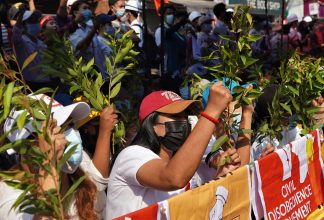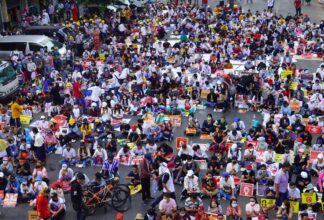The Need to Protect Myanmar’s Human Rights Defenders
On April 1, Myanmar’s first civilian government in nearly 50 years, led by Aung San Suu Kyi’s National League for Democracy, will take office in the capital of Naypyidaw. After months of speculation and elusive riddling, a new administration in Myanmar has finally been revealed with the Lady’s close friend and loyal ally, Htin Kyaw, as President. This is a remarkable step in the right direction, but there is still a long way forward before reform begets real change and the country can break free from its repressive past.
That Aung San Suu Kyi’s cabinet includes a number of former political prisoners inspires some confidence in the new government. But will the administration be able to effectively remedy a long legacy of abuse? The continued arrest, prosecution, and imprisonment of human rights defenders including journalists, students, and land rights activists has only escalated in the past many months.
Repressive laws, both old and new, are being selectively applied to maximise jail sentences through various legislative loopholes. Last year saw the first known application of new media laws including the Electronic Transactions Act and the Telecommunications Law where mere satire brought forward defamation charges and many months of imprisonment. The Assistance Association for Political Prisoners estimates that of February 90 political prisoners remain behind bars and over 400 are facing politically motivated charges, many of whom are human rights defenders.
The new administration should make it a priority to fulfil ex-President Thein Sein’s failed pledge to promptly release all political prisoners. It should firmly commit to protecting a space for human rights defenders to operate without fear of reprisal. Human rights defenders should be able to develop their role in monitoring, promoting, and protecting human rights without harassment and intimidation.
The military still wields extensive control over government affairs and beyond, which limits this transition to democracy as partial at best. The military holds an effective veto over all constitutional change and control over three key government ministries. And the military’s nomination of Myint Swe for Vice President does not inspire confidence to this end. The notorious ex-military hardliner was Yangon Regional Commander during the suppression of the Saffron Revolution. The thousands-strong demonstrations of 2007, where students, political activists, and monks called for basic living standards and genuine dialogue with political opposition, saw a violent crackdown on peaceful protestors. Hundreds were subjected to arbitrary arrest, detention, interrogation, and torture. 32 people, including monks, were shot dead on the streets of Yangon and had a lasting impact on the regime’s credibility.
A reputed ‘crony’ with vested business interests around the country, Myint Swe has held post of the Chief Minister of Yangon since 2011. Following a student demonstration in Yangon in March 2015 he deployed a paramilitary group to crackdown on the activists. Many have expressed disappointment at the military’s decision to nominate Myint Swe.
The Lady and her allies have yet to articulate a concrete human rights agenda going forward. It would bode well for the administration to now publicly commit to a tangible plan of action to deliver on its commitments vis a vis international human standards. Crucially, this includes amending the Right to Peaceful Assembly and Peaceful Processions Act that directly hinders freedom of association and expression by providing considerable latitude to authorities in defining legitimate ‘assembly.’ The NLD should promptly ratify key human rights conventions, including the International Covenant on Civil and Political Rights and ensure that the Office of the High Commission of Human Rights is granted a full mandate in-country.
Judicial reform is critical in allowing the rhetoric of reform to coincide with reality. The sheer number of trumped up and politically motivated arrests posit a direct challenge to the independence of the judiciary. Where the judiciary remains either directly or indirectly involved in the continued persecution of human rights defenders and others, due process and fair trial rights cannot effectively materialize. Additionally, committing to instating tangible reforms to the National Human Rights Commission, including, at minimum, independence, should be an on-going effort.
Myanmar has undergone tremendous change since its darker days of authoritarian rule and repression. Still, the transition to democracy has seen aspects of reform stagnate and reverse in the past years. The new government should, from the very onset, publicly commit to making verifiable changes towards meeting Myanmar’s human rights commitments. The reform process still has a long way to go and protecting the space for human rights defenders is a key place to begin.
This article was first published in the Huffington Post on 31 March 2016: The Need to Protect Myanmar’s Human Rights Defenders.
By Shaivalini Parmar, Myanmar Programme Officer , Civil Rights Defenders.

